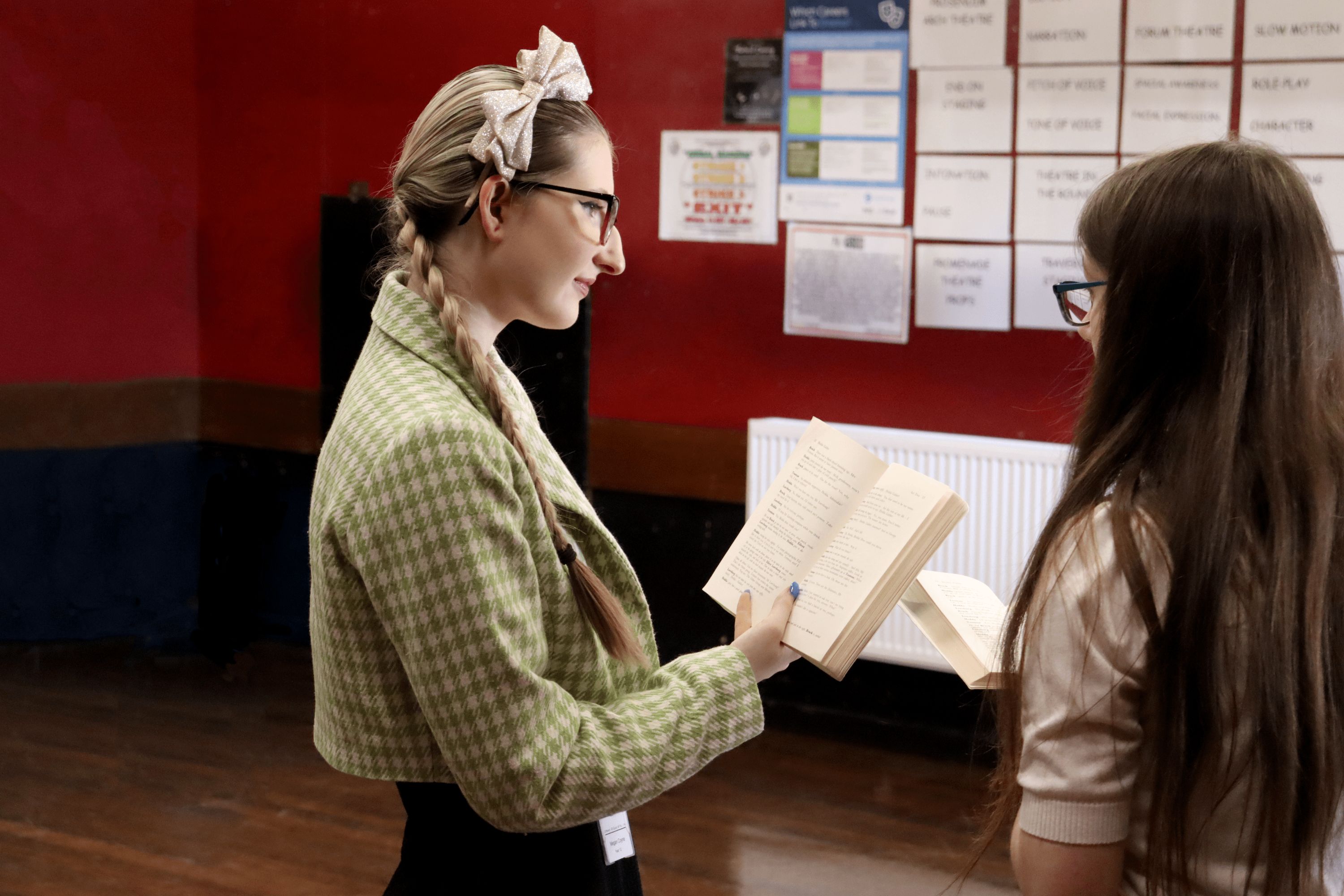Drama and Theatre
Curriculum Leader: Mrs R Goldberg - goldbergr@saintgeorgescofe.kent.sch.uk
Students of AQA Drama and Theatre develop skills that are not just essential for drama but applicable to a wide range of higher education subjects and in the workplace. This course refines students' collaborative skills, their analytical thinking and their approach to research. Students grow in confidence and maturity as they successfully realise their own ideas. They learn to evaluate objectively and develop a sound appreciation of the influences that cultural and social contexts can have on decision-making. Whatever the future holds, students of A-level Drama and Theatre emerge with a toolkit of transferable skills preparing them for their next steps.
Subject Requirements
- GCSE English - Grade 4
- GCSE Drama - Grade 5 or above or VQ Drama - Merit or above
- (external experience will be considered)
Intent
The Drama curriculum covers a range of topics designed to stimulate pupils’ creativity, provide historical and cultural awareness and inspire students to try and experience things they may not have done previously in the arts. Many key practical skills and concepts are introduced during KS3 and these are refined and explored further in KS4 and 5 to ensure academic excellence.

Implementation

The implementation of the curriculum comes from various style and practitioner workshops as well as opportunities to devise, perform and work collaboratively. Lessons follow a carefully sequenced pattern where key skills are built and then developed throughout the learning journey to ensure every child flourishes.
We ensure that SEND and disadvantaged children are given the necessary support in class to fully access the Curriculum and that equal opportunities are given to all.
Impact
When studying Drama students begin to grow in confidence allowing them to flourish in many different social and professional situations. They also grow in terms of being able to critically analyse, problem solve and use their creative thinking amongst other things.
Drama allows students to experiment with ideas practically, they have a greater appreciation for the arts and how it allows students to express themselves and become more of their own person

Topics
- Devising
- Script Reading
- Vocal Techniques
- Jerusalem – Jez Butterworth
- Our Countries Good – Timberlake Wertenbaker
- Live Theatre
- Essay writing
Assessments
Component 3
Performance of extract 3 (performance)
Interpretation of extract 1, 2 and 3 (logbook)
60 Marks
30% of A-Level
Content:
Study of practitioner
Study of set extracts and scripts
Component 2
Process of creating devised drama (logbook)
Performance of devised drama (performance of devised piece)
60 Marks
30% of A-Level
Content:
Study of a practitioner
Influence of research and themes upon a production
Component 1
3 hour open book written exam
80 Marks
40% of A-Level
Content:
Knowledge and understanding of drama
Study of two set texts
Analysis of live theatre production
Examining board link: AQA A Level Drama and Theatre
Drama Future Paths
What skills will you develop by taking this qualification?
In Drama and theatre studies, students develop the following skills: Confidence, Teamwork, Communication, Effective Collaborative Working Solutions, Creative Thinking, Creative Writing, Evaluation Skills, Critical Analysis, Problem Solving Skills, Public Speaking.
All these transferable skills developed by students are highly sought after by many higher education institutions and places of work and will help students get onto their chosen career paths.
Not only does this course provide access to those wishing to attend traditional drama and theatre schools, but it also offers access to a wide range of university and career paths.
What higher education or careers opportunities can the qualification lead to?
More traditional universities offer drama as a stand-alone subject where students can home in on their skills and practices developed at further education. Also, an A-Level in drama will aid with English Literature studies at higher education where students will continue to analyse and evaluate set texts.
If students wish to continue their theatrical training, then performing arts/drama schools are the ideal route. Students here will be starting their professional journeys, whether that be on or off-stage, and they will be continuing to use skills developed at A-Level.
Future careers in drama include but are not limited to: Actor, Stage Manager, Event Manager, Designer (Lighting, Sound, Set, Costume etc.), Director, Drama Therapist, Teacher, Playwright, Community Arts Worker, Theatre Manager, Talent Agent etc.
Extra Resources
- Book: Our Countries Good - Timberlake Wertenbaker
- Book: Jerusalem - Jez Butterworth
- Book: Frantic Assembly Book of Devising
- Book: Bertolt Brecht - An Actors Toolkit
